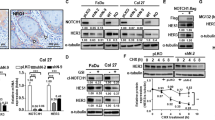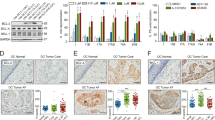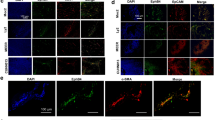Abstract
Previous reports have shown that fresh tissues and cell lines from patients with squamous cell carcinoma of the head and neck (SCCHN) overexpress transforming growth factor alpha (TGF-α) and its receptor, the epidermal growth factor receptor (EGFR) at both the mRNA and protein levels. Protein localization studies confirm that TGF-α and EGFR are produced by the same epithelial cells in tissues from head and neck cancer patients further supporting an autocrine growth pathway. Using three strategies, we examined the hypothesis that downmodulation of EGFR would reduce the proliferation of SCCHN cells. We targeted EGFR mRNA using antisense oligonucleotides and the mature EGFR protein at two sites, the ligand-binding domain and the kinase domain, and determined the effects of this targeting on SCCHN proliferation. Treatment of several SCCHN cell lines with a pair of antisense oligodeoxynucleotides directed against the translation start site and first intron-exon splice junction of the human EGFR gene resulted in decreased EGFR protein production and inhibited growth by 86% compared to a 13% reduction in cells treated with sense oligonucleotides (P=0.03). Growth inhibition was specific for carcinoma cells since the same EGFR antisense oligonucleotides had no effect on the proliferation of normal mucosa cells harvested from non-cancer patients. Two monoclonal antibodies which block ligand binding to EGFR (MAbs 425 and 528) inhibited the growth of several SCCHN cell lines by up to 97% which suggests that EGFR is participating in an autocrine pathway in SCCHN that is, at least in part, external. An EGFR-specific tyrosine kinase inhibitor (PD 153035) was found to inhibit EGFR phosphorylation in SCCHN cell lines and to reduce growth by 68% although it had no effect on the growth rate of normal mucosal epithelial cells. These experiments indicate that EGFR gene expression and function is critical for SCCHN cell growth but not for growth of normal mucosa cells and therefore may serve as a tumor-specific target for preventive and therapeutic strategies in head and neck cancer.
This is a preview of subscription content, access via your institution
Access options
Subscribe to this journal
Receive 50 print issues and online access
$259.00 per year
only $5.18 per issue
Buy this article
- Purchase on Springer Link
- Instant access to full article PDF
Prices may be subject to local taxes which are calculated during checkout
Similar content being viewed by others
Author information
Authors and Affiliations
Rights and permissions
About this article
Cite this article
Grandis, J., Chakraborty, A., Melhem, M. et al. Inhibition of epidermal growth factor receptor gene expression and function decreases proliferation of head and neck squamous carcinoma but not normal mucosal epithelial cells. Oncogene 15, 409–416 (1997). https://doi.org/10.1038/sj.onc.1201188
Received:
Revised:
Accepted:
Issue Date:
DOI: https://doi.org/10.1038/sj.onc.1201188
Keywords
This article is cited by
-
Limited short-term effects on human prostate cancer xenograft growth and epidermal growth factor receptor gene expression by the ghrelin receptor antagonist [D-Lys3]-GHRP-6
Endocrine (2019)
-
Survival, recurrence and toxicity of HNSCC in comparison of a radiotherapy combination with cisplatin versus cetuximab: a meta-analysis
BMC Cancer (2016)
-
Nucleic acid targeting: towards personalized therapy for head and neck cancer
Oncogene (2016)
-
Combination of erlotinib and EGCG induces apoptosis of head and neck cancers through posttranscriptional regulation of Bim and Bcl-2
Apoptosis (2015)
-
Chemovirotherapy for head and neck squamous cell carcinoma with EGFR-targeted and CD/UPRT-armed oncolytic measles virus
Cancer Gene Therapy (2012)



